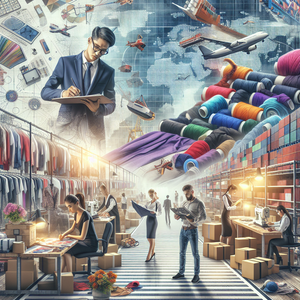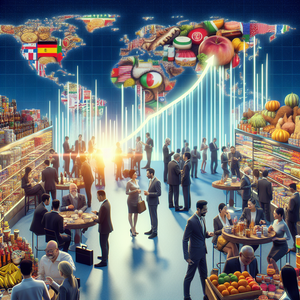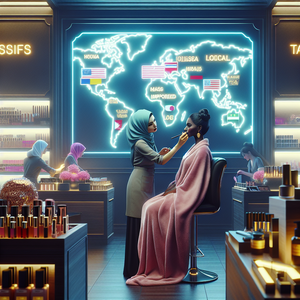
Thriving in the Fashion Industry Amid Tariff Turmoil: 20 Career Paths Shaping a Resilient Future
The fashion industry is navigating an era of profound transformation, driven by the ripple effects of shifting trade policies, rising tariffs, and supply chain disruptions. The imposition of steep tariffs on imports from key manufacturing hubs such as China, Mexico, and Canada has forced companies to reassess their sourcing strategies, production methods, and logistics infrastructure. Retailers in the United States, for example, are grappling with higher costs, extended lead times, and fluctuating regulations. In response, brands are exploring alternatives like nearshoring production to Central America, though challenges like lower labor productivity and limited infrastructure in the region persist. Amid these challenges, the demand for skilled professionals who can steer companies through this evolving landscape has surged. From technical roles to strategic leadership positions, opportunities abound for those who can analyze tariff impacts, implement sustainable sourcing strategies, and streamline global supply chains. This article dives into 20 emerging career paths within the fashion industry, each tailored to the complexities of a trade environment in flux. Whether your interests lie in logistics, sustainability, innovation, or policy analysis, these roles offer a unique chance to make a meaningful impact in an industry undergoing seismic change.
Job Summaries:
Supply Chain Analyst:
- Supply chain analysts play a pivotal role in helping brands navigate tariff-driven supply chain disruptions.
- They assess the flow of goods, identify cost-saving opportunities, and recommend strategies like nearshoring or supplier diversification.
- Proficiency in data analysis tools such as SAP and a strong grasp of global trade dynamics are key.
- For instance, companies like Levi’s have reworked their supply chains to reduce reliance on tariff-heavy regions, a move often spearheaded by supply chain analysts.
Trade Compliance Officer:
- Trade compliance officers ensure companies adhere to ever-changing international trade laws.
- This involves managing customs documentation, monitoring regulatory updates, and ensuring accurate tariff classifications.
- A deep understanding of global trade laws, coupled with certifications in trade compliance, is essential.
- Their work safeguards companies against costly penalties while allowing smooth global operations.
Logistics Coordinator:
- With tariffs complicating global shipments, logistics coordinators are essential in ensuring timely and cost-effective transportation of goods.
- They negotiate shipping costs, plan efficient routes, and collaborate with customs officials to mitigate delays.
- For example, many fashion brands now rely on logistics coordinators to optimize shipping lanes for textiles imported from tariff-free zones.
Sourcing Manager:
- As tariffs drive up costs, sourcing managers are tasked with finding alternative suppliers in regions with lower trade barriers.
- They negotiate favorable terms, explore nearshoring options, and ensure suppliers meet quality standards.
- Companies like Zara have embraced nearshoring in Europe to mitigate tariff risks, a shift led by sourcing professionals with in-depth market knowledge.
Customs Broker:
- Customs brokers facilitate the seamless import and export of goods, ensuring compliance with trade regulations.
- They handle documentation, classify items under tariff schedules, and resolve customs issues.
- Certification and expertise in international trade processes make them indispensable in minimizing delays and avoiding regulatory pitfalls.
Sustainability Manager:
- Sustainability managers are tasked with aligning supply chains with environmentally friendly practices while managing costs.
- They explore options like sourcing recycled materials, adopting sustainable textiles, and localizing production to reduce carbon footprints.
- Brands such as Patagonia have embraced sustainability as a competitive edge, driven by the expertise of these professionals.
Apparel Production Planner:
- Production planners coordinate manufacturing schedules, balancing demand forecasts with supply chain realities.
- They adjust production strategies to accommodate tariff impacts, ensuring smooth operations despite disruptions.
- Analytical skills and experience in manufacturing are critical, as planners must adapt to shifting trade policies.
Global Trade Consultant:
- Global trade consultants analyze the impact of tariffs and other trade policies on business operations.
- They develop risk management strategies, advise on compliance, and identify cost-saving opportunities.
- A background in economics or international business is essential.
- These consultants are particularly valuable to companies transitioning their supply chains to mitigate tariff exposure.
Retail Merchandiser:
- Retail merchandisers manage pricing, product assortment, and inventory to counteract the rising costs associated with tariffs.
- They analyze consumer trends and adjust strategies to protect profit margins.
- For example, by sourcing more locally produced apparel, merchandisers can maintain competitive pricing while reducing reliance on imports.
Textile Innovation Specialist:
- Textile innovation specialists focus on developing cost-effective and sustainable fabrics that are less impacted by trade restrictions.
- Their work includes researching new materials and improving existing ones to meet performance and affordability standards.
- Innovations like biodegradable textiles have gained traction, thanks to specialists pushing the boundaries of material science.
Nearshoring Strategy Manager:
- As nearshoring becomes a popular solution for reducing tariff exposure, nearshoring strategy managers oversee the shift to regional production.
- They assess the viability of local suppliers, establish partnerships, and address logistical challenges.
- Their work is critical in helping brands like HanesBrands, which has increased its reliance on Central American factories, adapt to new realities.
Economic Policy Analyst:
- Economic policy analysts examine the broader implications of trade policies on the fashion industry.
- They provide actionable insights, forecasting trends and helping businesses adapt their strategies.
- A strong foundation in economics or public policy is vital, as these analysts guide companies through uncertain trade landscapes.
Apparel Quality Control Specialist:
- As brands diversify their sourcing regions to avoid high tariffs, quality control specialists ensure that products maintain consistent standards.
- They inspect materials, oversee production processes, and enforce quality protocols.
- Their role is crucial in ensuring customer satisfaction, even as supply chains evolve.
Fashion Brand Strategist:
- Fashion brand strategists develop marketing and operational strategies that address the challenges posed by tariffs.
- They analyze consumer behavior, market trends, and trade impacts to craft strategies that keep brands competitive.
- Smaller brands have leveraged their agility to promote locally made goods, a strategy often spearheaded by brand strategists.
Import/Export Manager:
- Import/export managers oversee international shipments, ensuring compliance with trade regulations and optimizing shipping routes.
- They play a critical role in maintaining efficient global operations, particularly as companies navigate tariff-related complexities.
Tariff Data Analyst:
- Tariff data analysts specialize in identifying cost-saving opportunities within complex tariff structures.
- They analyze trade data, optimize supply chains, and recommend strategies to minimize expenses.
- Their insights help companies like Gap adapt their operations to remain competitive.
Ethical Fashion Consultant:
- Ethical fashion consultants help brands align with sustainable practices while addressing tariff challenges.
- They explore eco-friendly materials, ethical sourcing options, and cost-effective solutions to reduce reliance on tariff-heavy imports.
E-commerce Operations Manager:
- E-commerce operations managers optimize online retail channels in response to tariff-induced challenges in physical retail supply chains.
- They manage inventory, logistics, and pricing strategies to maintain profitability in a rapidly changing market.
Material Cost Analyst:
- Material cost analysts evaluate the financial impact of tariffs on raw materials and finished goods.
- They recommend cost-effective alternatives and negotiate pricing, ensuring profitability despite rising trade costs.
Infrastructure Development Consultant:
- As nearshoring gains momentum, infrastructure development consultants assess and improve regional production capabilities.
- They identify gaps in logistics, facilities, and workforce readiness, helping companies build resilient supply chains.
The fashion industry is undergoing a transformative period, with tariffs and trade policies reshaping its workforce and operations. These 20 careers reflect the innovative and strategic approaches required to navigate this dynamic landscape. Whether you’re drawn to logistics, sustainability, or innovation, equipping yourself with the right skills can position you as a key player in building a resilient and forward-thinking fashion industry. Explore these roles and take the next step in shaping the future of fashion.
Explore More Jobs

